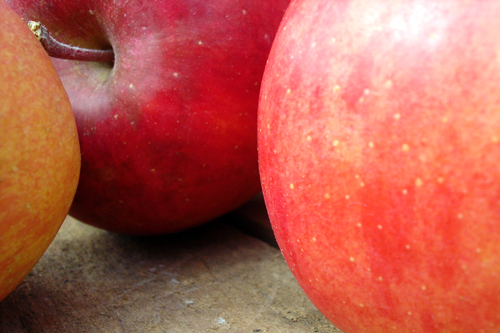Before ubiquitous frozen yogurt, before the Internet everywhere all the time, before my crazy new puppy, I knew how to do this.
Eat an apple. Mindfully.
Eat an apple. One bite at a time. Chew slowly. Put it down between bites. Think about where it came from, who grew it, how it got to my table, why it’s going in my mouth. The color, the texture, the scent. Am I still hungry? Yes. Then repeat.
Still, I devour that frigging apple as I listen to Fresh Air on NPR and update my Facebook status and…where the hell is my dog?
My apple frenzy is writer Michael Pollan’s fault. In his book The Omnivore’s Dilemma, Pollan turned mindful eating into an extreme sport by preparing a meal consisting of food he had hunted, grown, or gathered. In a recent interview in New York magazine, Pollan, famous for telling us to “Eat food. Not too much. Mostly plants,” suggested that we consider eating an apple whenever we think we are hungry. If we’re not willing to go to the trouble of eating an apple, then we’re probably not hungry. If we are, hey: we ate an apple.
It seemed like a good idea. I didn’t want to go on another diet. I felt heavy. I wanted to be lighter. I longed to reconnect with the part of me that does only one thing at a time. That knows exactly when she is hungry and when she is full. That savors a firm Fuji apple from Washington State. A spicy Macoun from Massachusetts. Or a festive-sounding Gala all the way from Chile.
But there I go, mid-apple: checking the Internet. It’s research—I’m looking for a Michael Pollan quote. Oh. Look. Michael Pollan has a cute tweet about a dog eating his latest book. And the picture of the ruined book? It’s on Instagram.
And my mind abandons the apple and fills with thoughts of junk food…
I think: I have meditated with famous people. When I first learned yoga, it wasn’t even cool yet; Madonna was still in bustiers. Why can’t I do this?
And the apple is gone and I haven’t even tasted it.
Then I started reading The Yoga of Eating by activist Charles Eisenstein. There are yoga exercises in his book, but it is as political as it is spiritual. He has great confidence that if we just listen to our bodies (a familiar phrase in mindful eating books), we will start feeding ourselves what we really need.
According to Eisenstein, many of us have responded to our frenetic, alienated culture with disordered eating. A woman in a bad relationship and a crummy job reaches for comfort, and finds it in fast food.
Her response isn’t optimal. But Eisenstein believes that we are all doing the best we can with what we’ve got. He says: “The proper attitude toward one’s self, with all its folly, all its selfishness and hurting of others, is one of pity, compassion, and understanding.”
And after I read that, something eased open inside of me.
My apple isn’t just an apple.
It’s longing. It’s nostalgia.
I miss the person with the orderly yoga practice, with the consistent meditation sitting. The person who was content to eat 10 organic corn chips in a small white bowl and…stop. Who sometimes could imagine the orchard the Fuji apple came from. I miss her. But she is gone.
Now, sometimes I eat the apple in quiet contemplation. And other times, I have the dog’s leash in one hand, the apple in the other, and This American Life on the radio.
And it’s enough. Well, almost. I’ve also lost three and a half pounds. Could be the apples. Could be the mindfulness. Could also be the new puppy, who is a profoundly attentive eater, not to mention an energetic walker.
This is me now. Fragmented. And whole.
Photo by Marcelo Ronchini




1 Comment
Tom Tiernan
Martha
“I miss her. But she is gone.” Sounds like her newest incarnation is back.
I would also add there is a need for mindfulness in forgiving one’s self when straying from the path, eating the bad, or eating while distracted. Forgiving self and then getting back to what’s good for us. Otherwise the unneeded shame ensures we perpetuate the unhealthy.